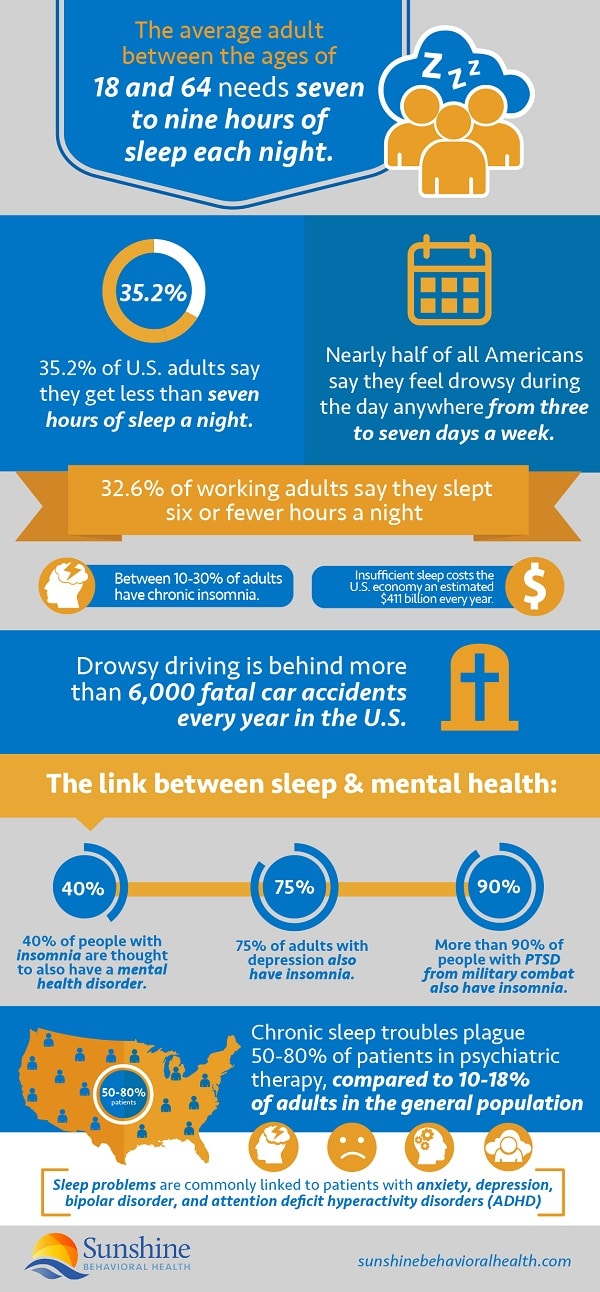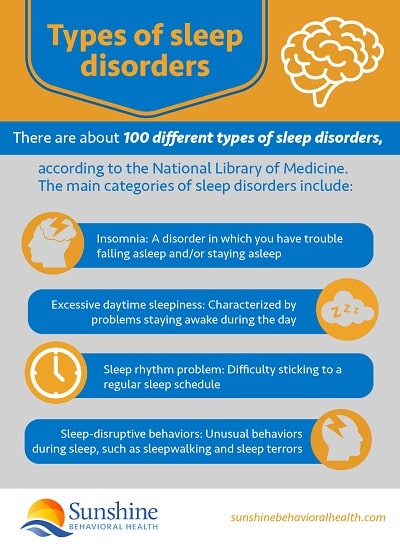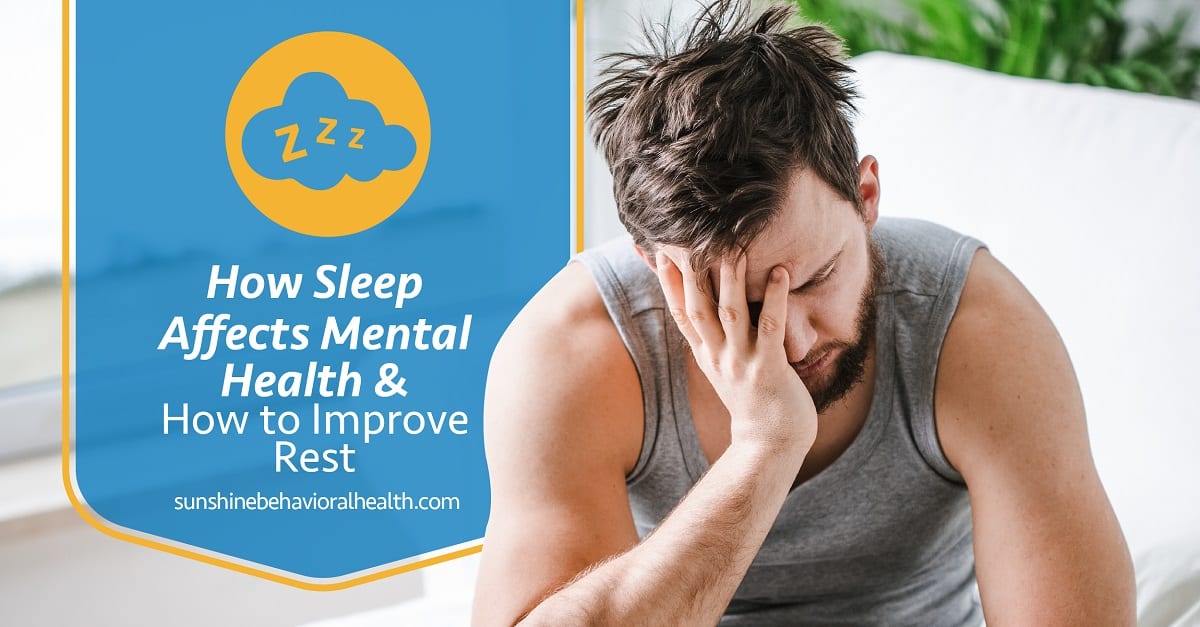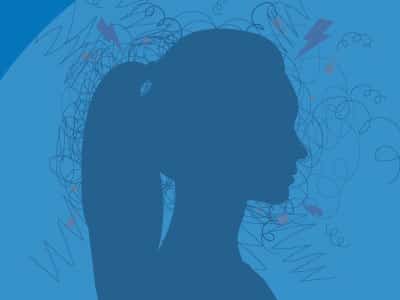Sleep is essential for physical health, but it also plays an important role in mental health. Sleeping gives your body and your brain a chance to rest and recharge. Getting enough sleep helps you feel alert and energetic, while getting inadequate sleep can leave you feeling slow and unable to operate at your full potential.
The average adult between the ages of 18 and 64 needs seven to nine hours of sleep each night, according to the National Sleep Foundation, but more than a third of adults in the United States report sleeping less than seven hours per night. Certain Americans, such as working adults, single parents, and active-duty members of the military have a higher risk of sleep deprivation.
About Sleep and its Effects on Mental Health
While sleep problems affect only about 10-18% of adults in the United States, according to Harvard Medical School, anywhere from 50-80% of patients in a typical psychiatric practice have chronic sleep problems.
A normal sleeper cycles between two main types of shut-eye — quiet sleep and rapid eye movement (REM) sleep — every 90 minutes. The length of time a person spends in each type of slumber changes as sleep progresses.
Quiet sleep has four stages; each stage is increasingly deep. During each stage of quiet sleep, body temperature decreases, muscles relax, and the sleeper’s breathing and heart rate slow. The deepest stage of quiet sleep triggers physiological changes that help boost the immune system.
The other type of sleep, REM, is when you dream. During REM sleep, your body temperature, blood pressure, heart rate and breathing increase to the same levels as when you are awake.
Research shows REM sleep enhances learning and memory. REM sleep also contributes to your emotional health by helping your brain process emotional information. During REM sleep, your brain is busy evaluating and remembering your thoughts and memories. Lack of sleep prevents your brain from consolidating positive emotional content, which can influence your mood and affect your emotional reactions to everyday events. Poor sleep is also associated with the development and severity of mental health disorders, including suicidal thoughts or behaviors.
Disruptions in your sleep can affect the levels of certain chemicals in your body. Specifically, sleep problems can affect the chemicals that help pass messages, known as neurotransmitters. Sleep disruptions can also affect the level of stress hormones. Sleep-induced changes in these neurotransmitters and stress hormones can scramble communication in your brain, so poor sleep can impair your thinking and make it difficult to regulate your emotions. Fluctuations in neurotransmitters and stress hormones can amplify the effects of psychiatric disorders, and vice versa.
Sleep affects specific parts of the brain. One such area, the amygdala, is responsible for our emotional responses. It processes emotion while we sleep. Inadequate sleep pushes the amygdala into overdrive, which then intensifies our immediate emotional reactions to things. In fact, research using magnetic resonance imaging (MRI) brain scans showed that the amygdala is about 60% more emotionally reactive among subjects who were sleep-deprived, compared to well-rested participants. Lack of sleep intensifies both negative and positive emotions, so sleep deprivation may leave you on an emotional rollercoaster.
Another area of the brain, known as the prefrontal cortex, is also involved in emotional regulation. The prefrontal cortex is the “voice of reason” that helps control our emotional impulses; it works closely with the amygdala. Like the amygdala, though, the prefrontal cortex cannot do its job when deprived of sleep, which makes us more impulsive and less likely to think through our emotional reactions.

Types of Sleep Disorders
There are about 100 different types of sleep disorders, according to the National Library of Medicine. The main categories of sleep disorders include:
- Insomnia: A disorder in which you have trouble falling asleep and/or staying asleep
- Excessive daytime sleepiness: Characterized by problems staying awake during the day
- Sleep rhythm problem: Difficulty sticking to a regular sleep schedule
- Sleep-disruptive behaviors: Unusual behaviors during sleep, such as sleepwalking and sleep terrors
Mental Health Issues Associated with Sleep Problems
Lack of sleep is linked to many specific mental health problems, such as depression, seasonal affective disorder, anxiety disorders, bipolar disorder, schizophrenia, substance use disorders, and more.
Depression
About 75% of people with depression show symptoms of insomnia, and 10-40% of adults with depression get too much sleep. The relationship between sleep and depression seems bidirectional, which means poor sleep seems to worsen depression and worsening depression can interfere with sleep.
Seasonal affective disorder
Seasonal affective disorder is a type of depression that typically develops during the time of the year with the fewest daylight hours. The condition is associated with a person’s biological clock, or circadian rhythm, which helps the body know when to sleep and when to be awake. Seasonal affective disorder can cause a person to sleep too much or too little.
Anxiety disorders
Anxiety is a core element in a number of disorders that create excess fear or worry that can interfere with everyday life, and many anxiety disorders are associated with sleep problems. Types of anxiety disorders include:
- Generalized anxiety disorders: In which people experience significant looming worries and an overarching sense of anxiety
- Panic disorders: Characterized by brief, intense episodes of fear that typically last for a few minutes
- Social anxiety disorder: Involves fear of social settings and worries about embarrassment in front of others
- Specific phobias: Or, fears about certain things, such as open or closed spaces, being in a crowd, etc.
- Post-traumatic stress disorder (PTSD): This may arise as the result of a painful or disturbing experience
Left unchecked, anxiety disorders can lead to heart problems, such as rapid heart rate (tachycardia) and increased blood pressure. Some research suggests anxiety can even contribute to the development of diabetes.
The Sleep Foundation says that insomnia and other sleep disturbances are common symptoms of anxiety disorders, as excessive worry at night can prevent someone from falling asleep. In fact, the U.S. Department of Veterans Affairs (VA) says that more than 90% of Vietnam-era veterans with PTSD associated with military combat have reported symptoms of insomnia.
Sleep Disturbances and Addiction
There is a link between sleep troubles and substance use disorders, too. It can be likened to a dual diagnosis. That’s when a mental illness like depression or schizophrenia co-occurs with an addiction to drugs or alcohol.
Irregular or insufficient sleep can also co-occur with substance use disorders. In a dual diagnosis situation, the addiction can result from a mental disorder (often as a means of self-medicating), but a disorder can also result from an addiction.
The same applies with sleep disturbances. A person may have trouble sleeping as a result of substance use, but insomnia and other sleep issues can cause a person to resort to substance use in pursuit of a restful sleep.
It’s well known that many substances affect slumber, including how long it takes to drift off, the length of sleep, as well as the quality. A person with a dependence on drugs or alcohol may also experience insomnia during withdrawal, which can play a role in relapse. Because poor sleep affects mood and memory, that also may make it more challenging for a person in recovery to cope and adjust to abstinence.
How to Improve Rest
 Improving the quality and quantity of your sleep may help benefit your mental wellness, but getting more sleep is often easier said than done; this is especially true if poor sleep is the result of mental health issues. Fortunately, you can take steps to improve your sleep in ways that also boost mental wellness. Some of these steps involve improving your bedroom environment and sleep-related habits, also known as sleep hygiene.
Improving the quality and quantity of your sleep may help benefit your mental wellness, but getting more sleep is often easier said than done; this is especially true if poor sleep is the result of mental health issues. Fortunately, you can take steps to improve your sleep in ways that also boost mental wellness. Some of these steps involve improving your bedroom environment and sleep-related habits, also known as sleep hygiene.
Be consistent
Go to bed at the same time each night (or day, if you are a shift worker), and get up at the same time every morning on both weekdays and weekends. While it may be tempting to stay up late to reduce insomnia or sleep in, your brain and body respond better to daily routines. To change your sleep schedule, adjust your bedtime and wake-up time by an hour or two over the course of several nights.
Avoid naps
While taking a nap can help energize you during the day, it can throw off your sleep schedule at night. If you must nap, keep naps relatively short and limited to only late mornings or early afternoons.
Follow a nightly routine
Following the same nightly routine, such as brushing your teeth or putting on your pajamas, can send a message to your brain that it is time for sleep.
Wind down for 30 minutes
Engage in activities that make you calm and drowsy. Listen to soft music, for example, or read. You might benefit from gentle stretching or relaxation exercises. Avoid the use of cell phones, computers, tablets, and laptops, as these may be mentally stimulating.
Create a suitable sleep environment
For optimal sleep, make your bedroom dark, quiet, cool, and comfortable. Restrict bedroom use to only sleep and sex. Invest in a good mattress: 93% of people say that a comfortable mattress is important for quality sleep, according to the Sleep Foundation. Launder your bed linens regularly, as 78% of people say they are excited to go to bed when they have fresh-smelling sheets.
Avoid caffeine, alcohol, and nicotine
Caffeine keeps you awake. It is particularly important to avoid caffeine in the afternoon and evening hours, as caffeine has a half-life of five hours. This means that, five hours after you have consumed caffeine, your body has cleared only half of it from your system.
While alcohol depresses the nervous system at first to make you fall asleep quickly, the effects wear off and you will wake up in a few hours. Alcohol can also cause or worsen mood disorders, including depression.
Nicotine is a stimulant, which means it speeds up your heart rate and thinking.
For best results, give up caffeine, alcohol, and nicotine for good. If you are unable to quit, avoid using these substances for several hours before bedtime.
Go easy on the water/fluids before bed
Drinking lots of fluid before bedtime can result in frequent trips to the bathroom at night.
Cut back on sugary, high-carbohydrate foods
Sugar and other refined carbohydrates, such as pasta, white bread, and white rice can trigger wakefulness. Avoiding these foods in the evening can help you reach the deep, restorative stages of your sleep cycle.
Exercise
Engaging in regular physical activity can help you fall asleep faster, spend more time in deep sleep, and wake up less often. For best results, avoid working out right before bed, as strenuous exercise can wake you up.
Relaxation techniques
Various relaxation techniques, such as meditation and deep breathing exercises, can soothe anxiety and slow your racing thoughts. Alternately tensing and relaxing your muscles, a technique known as progressive muscle relaxation, can also help you fall asleep.
Cognitive behavioral therapy
Cognitive behavioral therapy (CBT) can help you identify any thoughts, feelings, and behaviors that might be contributing to insomnia. CBT can also help address anxiety disorders, depression, marital problems, alcohol and drug use problems, eating disorders and severe mental illness. The Centers for Disease Control and Prevention (CDC) is the official health protection agency for the United States. The CDC offers a number of resources, including links to the National Healthy Sleep Awareness Project, American Sleep Association, American Sleep Apnea Association, Circadian Sleep Disorders Network, American Academy of Sleep Medicine, and the Sleep Research Society. Anxiety and depression often go hand-in-hand with sleep problems. This international non-profit organization helps people with anxiety and depression find the help they need. The Anxiety and Depression Association of America offers a wide variety of resources, such as: The Substance Use Disorder and Mental Health Services Administration (SAMHSA) offers a confidential 24-hour helpline — 800a662aHELP — for anyone experiencing symptoms of anxiety, depression, or other mental health issues. Trained representatives can provide information on locating local drug rehabilitation facilities, support groups, and community organizations offering mental health support. Founded by doctors and scientists in 2002, the American Sleep Association provides a number of links to support groups and resources for sleep apnea, restless leg syndrome, narcolepsy, insomnia and circadian rhythm disorders. Harvard Medical School is the graduate medical school of Harvard University. Their Division of Sleep Medicine webpage offers videos and interactive tutorials that explain the importance of sleep, how sleep studies are done, and ways to improve your sleep.
Resources for Managing Sleep and Mental Health
Centers for Disease Control and Prevention
Anxiety and Depression Association of America
SAMHSA National Hotline
American Sleep Association
Harvard Medical School, Division of Sleep Medicine: Healthy Sleep
Sources
Medical disclaimer:
Sunshine Behavioral Health strives to help people who are facing substance abuse, addiction, mental health disorders, or a combination of these conditions. It does this by providing compassionate care and evidence-based content that addresses health, treatment, and recovery.
Licensed medical professionals review material we publish on our site. The material is not a substitute for qualified medical diagnoses, treatment, or advice. It should not be used to replace the suggestions of your personal physician or other health care professionals.






